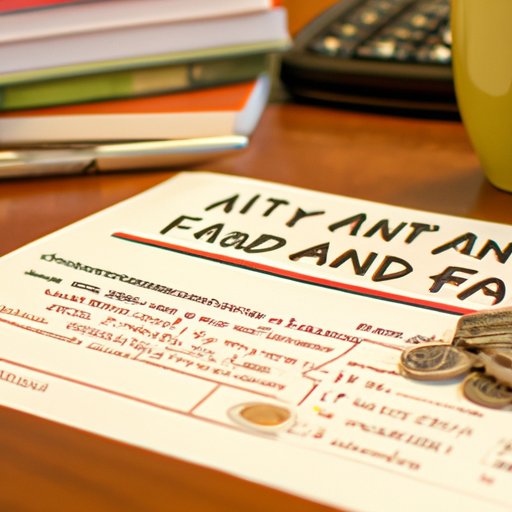Introduction
Financial aid is an important tool for helping students pay for college. It can come in many different forms, including grants, scholarships, work-study programs, and loans. But when it comes to financial aid, one of the most common questions is: do you have to pay it back?
The answer depends on the type of financial aid you receive and whether you meet the eligibility requirements. To help you better understand your financial aid obligations and make the most of your resources without having to pay them back, we’ve put together this comprehensive guide.

Exploring the Different Types of Financial Aid and Whether They Need to be Repaid
When it comes to financial aid, there are four main types: grants, scholarships, work-study programs, and loans. Let’s explore each one and whether or not you need to repay them.
Grants
Grants are a form of financial aid that does not need to be repaid. They are typically awarded based on financial need, although some may also be merit-based. The most common type of grant is the Federal Pell Grant, which is awarded to undergraduate students who demonstrate financial need. Other types of grants include state grants, college grants, and private grants.
Scholarships
Scholarships are another type of financial aid that does not need to be repaid. Like grants, they are typically awarded based on academic performance, extracurricular activities, and other criteria. Scholarships can be awarded by schools, organizations, businesses, and other entities.
Work-Study Programs
Work-study programs provide students with part-time jobs to help cover college costs. These jobs are typically related to the student’s field of study, and the wages earned do not need to be repaid. Work-study programs are typically administered through the school’s financial aid office.
Loans
Unlike grants, scholarships, and work-study programs, loans do need to be repaid. There are two main types of loans: federal loans and private loans. Federal loans are funded by the government and typically offer lower interest rates and more flexible repayment options than private loans. Private loans are issued by banks, credit unions, and other lenders.
A Guide to Understanding Your Financial Aid Obligations
If you’ve been awarded financial aid, it’s important to understand your obligations. Here’s what you need to know.
Eligibility Requirements
To receive financial aid, you must meet certain eligibility requirements. For example, you must:
- Be a U.S. citizen or eligible non-citizen.
- Have a valid Social Security number.
- Have a high school diploma or equivalent.
- Be enrolled in an eligible degree or certificate program.
- Not be in default on any previous student loans.
Repayment Terms
If you receive a loan, you’ll be required to sign a promissory note that outlines the terms of the loan, including the interest rate, repayment period, and monthly payment amount. You’ll also be required to complete entrance counseling to make sure you understand the terms of the loan and your responsibilities.

How to Make the Most of Financial Aid Without Having to Pay it Back
Financial aid can be a great resource for covering college costs, but it’s important to maximize your resources without having to pay them back. Here’s what you can do.
Maximize Grants and Scholarships
Grants and scholarships are the best way to cover college costs without having to pay them back. Start by exploring the grants and scholarships offered by your school, then look for external sources of funding. Websites like Fastweb, Scholarships.com, and CollegeXpress can help you find scholarships and grants tailored to your interests and goals.
Utilize Work-Study Programs
Work-study programs are a great way to earn money to cover college costs. Many schools offer part-time jobs related to your field of study, and the wages you earn don’t need to be repaid. Talk to your financial aid office to find out if you’re eligible for a work-study program.
What You Need to Know About Financial Aid Repayment Requirements
If you take out a loan to cover college costs, it’s important to understand your repayment requirements. Here’s what you need to know.
Interest Rates
The interest rate on your loan will determine how much you’ll owe in total. Federal loans typically have lower interest rates than private loans. Shop around to find the best rate and compare offers from multiple lenders.
Repayment Plans
Your repayment plan will determine how much you’ll pay each month and how long it will take to pay off your loan. Most federal loans offer flexible repayment plans, such as income-driven repayment plans and extended repayment plans. Talk to your lender to find out which repayment plan is best for you.

Tips for Repaying Financial Aid Loans Quickly and Efficiently
Repaying your loans can seem daunting, but there are a few steps you can take to make the process easier. Here are some tips for repaying your loans quickly and efficiently.
Start Making Payments Early
You don’t have to wait until your grace period ends to start making payments. By making payments while you’re still in school, you can reduce the amount of interest you’ll owe over the life of the loan.
Make More than the Minimum Payment
Making more than the minimum payment each month can help you pay off your loan faster and save money on interest. Even small increases in your payment can make a big difference over time.
Utilize Automated Payments
Many lenders offer automated payment plans that allow you to set up automatic payments from your bank account. This can help you stay on top of your payments and avoid late fees.
Conclusion
Financial aid can be a great resource for covering college costs, but it’s important to understand the terms of repayment. Grants, scholarships, and work-study programs don’t need to be repaid, but loans do. Make sure you understand your repayment obligations and take steps to pay off your loans quickly and efficiently.
(Note: Is this article not meeting your expectations? Do you have knowledge or insights to share? Unlock new opportunities and expand your reach by joining our authors team. Click Registration to join us and share your expertise with our readers.)
